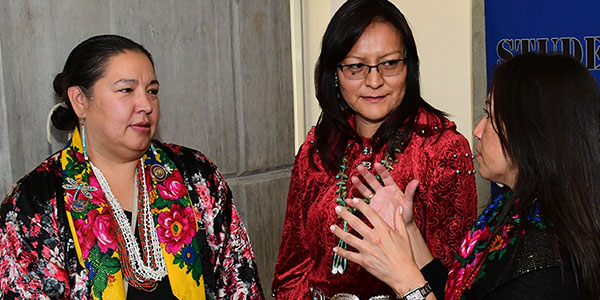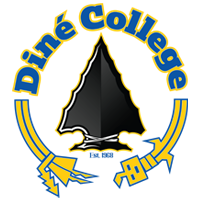
Navajo Council Delegate Amber Kanazbah Crotty, Navajo Nation First Lady Phefelia Nez and New Mexico Secretary of Indian Affairs Lynn Trujillo talk during a break of the recent Missing and Murdered Diné Relatives Forum.
The forum was held at Diné College’s Shiprock campus.
FOR IMMEDIATE RELEASE
SHIPROCK, N.M. — Navajo Nation Council Delegate Amber Kanazbah-Crotty nodded knowingly as Valya Cisco recounted the persistent worry that plagues her family as they search to find her missing sister, Ariel Begay.
The memories of their loss brought up challenges and obstacles that many families face as they seek answers and strive for justice. The stories from family members and law enforcement officials highlighted tragic and painful instances that entire communities face when dealing with missing and murdered men, women and children.
Earlier this year, Diné College made a commitment to partner with other educational institutions to initiate a movement to protect and recover Diné relatives across the Navajo Nation. In May, the Navajo Nation Office of the President and Vice President announced the Missing and Murdered Diné Relatives Forum, and in June it was declared by Diné College’s Office of the President that the college would host the forum at its Shiprock South Campus.
The two-day forum took place June 27th and 28th, and catapulted the collaborative efforts of the Navajo Nation Sexual Violence Prevention Work Group, Diné College, the Northern Arizona University Center for Health Equity Research, the Navajo Nation Speaker’s Office and the Navajo Nation Office of the President and Vice President to establish a Missing and Murdered Diné Relatives Data Institute.
In attendance at the John Pinto Lecture Hall were Navajo Nation council delegates Kanazbah-Crotty and Nathaniel Brown, as well as, Navajo Nation First Lady Phefelia Nez and former Navajo Nation Vice President Rex Lee Jim. The forum was moderated by Diné College Regent Theresa Hatathlie, with presentations from the Executive Director of Sovereign Bodies Institute Annita Lucchesi, New Mexico Secretary of Indian Affairs Lynn Trujillo, Navajo Nation Chief Justice Emeritus Robert Yazzie and University of Arizona E. Thomas Sullivan Professor of Law Robert A. Williams, Jr.; who expressed the need for specific actions that will provide opportunities to create long-term solutions and assert complete autonomy over data collection.
Traditional knowledge holders and medicine people were invited to provide protection and guidance, and they rallied support for this important cause. Speakers such as Rita Gilmore of Chinle, Ariz., utilized songs to guide the conversation toward healing. And, coalition members from the Coalition to Stop Violence Against Native Women (New Mexico), the Southwest Indigenous Women’s Coalition (Arizona), and Restoring Ancestral Winds (Utah) discussed the various ways to target problem areas across the Navajo Nation relating to crime and social issues.
Diné Colleges’ School of Business and Social Science presented a powerful discussion on racist laws that disempower the Navajo Nation from protecting its citizens. A panel discussion on eliminating the Major Crimes Act was moderated by social work faculty member Manasseh Begay and rounded out by the newly hired Diné College economics faculty Milton Bluehouse, Jr. The panel also featured world-renowned scholars Chief Justice Robert Yazzie and the University of Arizona’s Robert A. Williams Jr. They all stressed the need to take care of missing relatives on terms aligned with Diné culture.
It is the mission of the Navajo Nation to develop a digital database that can be analyzed and used as a tool to track criminal and social statistics related to this issue. The Missing and Murdered Diné Relatives Data Institute will provide a hub for various entities to converge, work together, share data, streamline communication and create a comprehensive plan to stop the widespread attacks on the Navajo people.
Diné College’s Dean of Business and Social Science Michael Lerma stated, “We cannot wait for state and federal agencies to solve this issue for us. We need to do it ourselves. The responsibility is on our shoulders. For those of us who have the resources and the capability to do more, we need to step up and do this for our relatives. K’ad7, T’aa nihí hasht’e da diilniił!”
Some Background
The U.S. Senate held a committee meeting with leaders from Indian Country in December to find solutions to the missing and murdered problem. Crotty is a member of the task force. She says there is a lot of distance among tribal, state and federal authorities when sharing information and that needs to be addressed. She told the dozens of audience members present that it should not be assumed that missing people leave on their own.
“I’m not a lawyer. I’m not a judge. But it’s happening,” Crotty said of the situation. “The Navajo Nation, like other indigenous nations in the U.S., has grappled with the issue of data collection and analysis,” Crotty continued. “As any expert will tell you, data is integral to how we view and understand social problems, strategize and create long-term solutions.”
Begay, 26, was from Oak Springs, Ariz., on the Navajo Nation Indian Reservation. She was last seen leaving her mom Jacqueline’s house and the case has since become an example of the hurdles that indigenous families of missing loved ones face. Cisco, and others, believe Begay was murdered. The problem is widespread throughout Indian Country.
“Communities are carrying the burden of finding the deceased,” Lucchesi said, “But communities don’t have the support to deal with that additional trauma.”
Lucchesi maintains one of the largest databases of missing and murdered indigenous women in Canada and the U.S. The data is made available to tribal advocates, activists, policy makers, service providers and community leaders.
Lerma noted that the Missing and Murdered Diné Relatives Data Institute would focus on the role of state and federal agencies, law enforcement, male and female perceptions around the Navajo Nation and demographic data collection. He said the organizational structure of such an institute is already in place.
The two-day forum was sponsored by Diné College School of Business and Social Science, the Navajo Nation Sexual Violence Prevention Work Group, the Navajo Nation Office of the President and Vice President and the Northern Arizona University Center for Health Equity Research.
CONTACT US
Marie R. Etsitty Nez
Vice President of External Affairs
marienez@dinecollege.edu
928-724-6985
George Joe, M.A., M.Ed, Director Of Marketing and Communications
grjoe@dinecollege.edu
928-724-6695
Bernie Dotson, Public Relations Officer
bdotson@dinecollege.edu
928-724-6697
